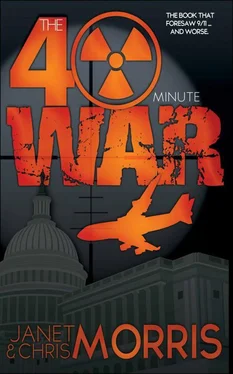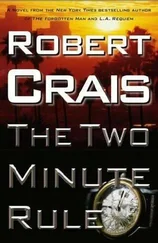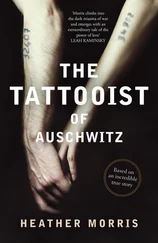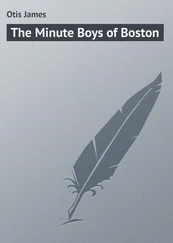Netanayhu’s glower had been fatherly and so Ashmead didn’t push it by telling the colonel he knew all that—that he had one of Zaki’s squeaky-clean bugs in place and so had a good idea of what Netanayhu had said to Morse, and to Beck, earlier today. There was no time for scoring vanity points.
“I just wanted you to know we were around, Colonel, so you could cover our asses for us—and that we thought things were pretty serious. They are. More serious than even we thought. My sources say there’s going to be a truck-bombing at the American Consulate at 2340 hours, but that it’s—”
“ Your sources?” This was a sore subject. “You’re not supposed to have such sources, not without approval from my office….” But Netanayhu didn’t have his heart in it tonight and Ashmead had to figure out why, and fast.
“Old sources, old friends. May I ask,” he stretched one leg up on the overstuffed couch, “why you aren’t surprised—about the consulate, I mean?”
“Surprised? What could surprise me these days? Nuclear terrorists attacking your government’s seat and touching off a superpower confrontation—one fears for the Knesset. Am I surprised when our Jewish friends in America who happen to have the ham radios tell us much that makes us think things in your country are far worse than we are told by your official reports? Am I surprised when I am warned away from internal disputes among Americans that are not explained, but come to my attention in unpleasant phone calls from Tel Aviv concerning an unspecified action I am not to take in response to an event of which no one has a clear picture—or, if they have, they will not say, just give scattered hints that we are not to be surprised if ‘something untoward should befall the American delegation?’ This ‘untoward something,’ Tel Aviv says, is not our business. Our business is seeing to the survival of the State of Israel, and right now that means the mobilization of all our forces.” Netanayhu, having dropped his own bomb and feeling that now the score was evened for Ashmead’s impolite penetration of his home’s defenses, offered him a drink: “And your leg, Rafic? It is still bothering you? And your wrist, your shooter’s arthritis?”
“Only when I have too much time to sit around and worry about what’s bothering me, Colonel.” Ashmead had accepted the two fingers of vodka gladly, moistened his lips, and regretfully put the glass down on the coffee table. With the vodka, Netanayhu, who seldom drank, was testing the waters further: was trouble so imminent that Ashmead would ask for coffee instead?
Ashmead did: “Black and as strong as Millie can make it—we don’t have much time. I’ve got to know if you’re going to stand around and twiddle your thumbs, like Tel Aviv wants, or if you’re going to help me save Operation Tiebreaker—I can’t imagine you’re too busy with a couple of border incursions to pass up a counterterrorist operation; you’re not going to be using Saiyeret on the front lines.”
Netanayhu eased his bulk around his desk and went deliberately to the door, opened it a crack and bawled in his best battlefield voice for coffee for two, shut it and threw a deadbolt, then came slowly back: “Some things, Rafic, not even nuclear war between the superpowers can alter. Tel Aviv and I still have the same understanding: if I can think of something to do before they think to forbid me, then I do it.” His old firehorse’s eyes were sparkling.
“And in this particular case?” Ashmead asked softly.
“In this particular case, I was already helping Beck; Tel Aviv wants only not to attack your still powerful CIA.” Netanayhu was treading carefully; he didn’t know how much Ashmead knew or how he was going to take the revelation that Dow was using Palestinians against the State of Israel.
“If my intelligence is correct—” Ashmead smiled like a basking crocodile “—this agent of ours, Dow, is mentally unbalanced from the recent tragedy. It will be a favor to us if you’ll help me retire him early—before he really hurts the relationship between our two services.”
Netanayhu nodded happily: “Then we shall surround the consulate, and when—”
“I’d rather not do that, Colonel. Let’s let ’em blow the consulate—it’s an American acting against America, with Palestinians, proof that what we’ll do then is justified. Anyway, I’d like to DX Dickson and as many of those involved in leaking Tiebreaker as I can.”
Netanayhu pursed his lips: “What of our friend Beck?”
“We’ll keep Beck out of it—in a state of ignorance, physically far removed from the action. I’ve got that part of it under control.”
“So?” Netanayhu put on a puzzled look: “Then what are we to do about this Dow, whom Tel Aviv insists we do not touch?”
“Dow is going to be in the field dressed like one of his Palestinians. The real target is the university lab—the serum,” Ashmead said carefully; Beck had taken great pains to keep the Israelis from finding out that what they were producing was an anti-cancer drug, not simply a medicine for radiation sickness. “Dow’s realized that if he can preempt it, he can sell that stuff one dose at a time to various well-heeled folks and become the first rich man in the new society. And since it’s the Hebrew University we’re talking about, seems to me that Tel Aviv couldn’t blame you if, in all ignorance and on barely five hour’s notice, you put together an interdiction team to stop these terrorists… with my help, at my instigation, or any other way you want to hand me the bag to hold.”
A tap came on the door. Puffing, Netanayhu muttered, “Coffee; as if we had time for a coffee klatch,” and went to unbolt it.
Millie herself had brought the tray; she craned her neck to see the visitor, then exclaimed with motherly disapproval: “Rafic! In my house, and no one tells me? You’re staying for dinner, of course, though one meal won’t put any flesh on—”
“Millie,” Netanayhu gave her The Look: “He’s not here, you didn’t see him, and even I won’t be home for dinner tonight.” Firmly, before she could reply, he took the tray from her and shut the door with his hip.
“The responsibility—this bag, as you call it,” Netanayhu said as he put down the tray and poured coffee from an ornate silver pot into the Rosenthal cups Millie had brought from Germany, “is not a problem. As you say, we are in all innocence interdicting terrorists, doing our jobs; and you, as in the past, are helping clandestinely. Are we not old friends? Officially, I know nothing of your unauthorized sorties into the Gulf after our mutual enemies.” Netanayhu’s sharp teeth clicked on his cup. “Now, tell me how much manpower, firepower, and air support you require.”
By the time they’d finished the logistics and the phone calls, Ashmead had barely two hours to put a fine edge on his strategy.
But he had Israeli support—he wanted to look like part of Saiyeret, if possible never to report his participation. His team had to blend into the larger elite force, and they did, even down to the Israeli Military Industries brass casings they’d leave on the road and the Galil rifling on the bullets they’d leave in their targets, some of which were the new top-secret explosive rounds that would kill a man if they so much as grazed him.
Dow was going to get exactly what he was ask ing for: he was going to be cut down like a terrorist, stitched up the middle like a rabid dog. It really bothered Ashmead when Agency people used their positions to get rich, and Dow had shown tendencies before: he’d been playing the currency market like a trust fund; if the Forty-Minute War hadn’t wiped him out, he’d probably have been able to retire in style. Now he was just going to retire early.
Читать дальше












